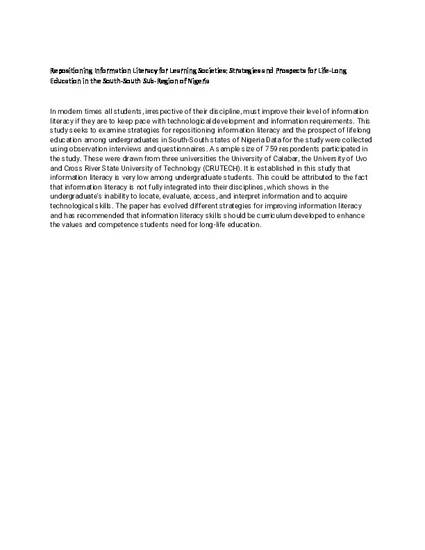
Article
Repositioning Information Literacy for Learning Societies: Strategies and Prospects for Life-Long Education in the South-South Sub-Region of Nigeria
Global Review of Library and Information Science
(2010)
Abstract
In modern times all students, irrespective of their discipline, must improve their level of information literacy if they are to keep pace with technological development and information requirements. This study seeks to examine strategies for repositioning information literacy and the prospect of lifelong education among undergraduates in South-South states of Nigeria Data for the study were collected using observation interviews and questionnaires. A sample size of 759 respondents participated in the study. These were drawn from three universities the University of Calabar, the University of Uvo and Cross River State University of Technology (CRUTECH). It is established in this study that information literacy is very low among undergraduate students. This could be attributed to the fact that information literacy is not fully integrated into their disciplines, which shows in the undergraduate's inability to locate, evaluate, access, and interpret information and to acquire technological skills. The paper has evolved different strategies for improving information literacy and has recommended that information literacy skills should be curriculum developed to enhance the values and competence students need for long-life education.
Disciplines
Publication Date
June 28, 2010
DOI
10.5281/zenodo.5524269
Citation Information
Aniebiet Inyang Ntui and Eno Joseph Ottong. "Repositioning Information Literacy for Learning Societies: Strategies and Prospects for Life-Long Education in the South-South Sub-Region of Nigeria" Global Review of Library and Information Science Vol. 1 Iss. 6 (2010) p. 41 - 47 Available at: http://works.bepress.com/aniebiet_ntui/25/
Creative Commons license

This work is licensed under a Creative Commons CC_BY International License.
